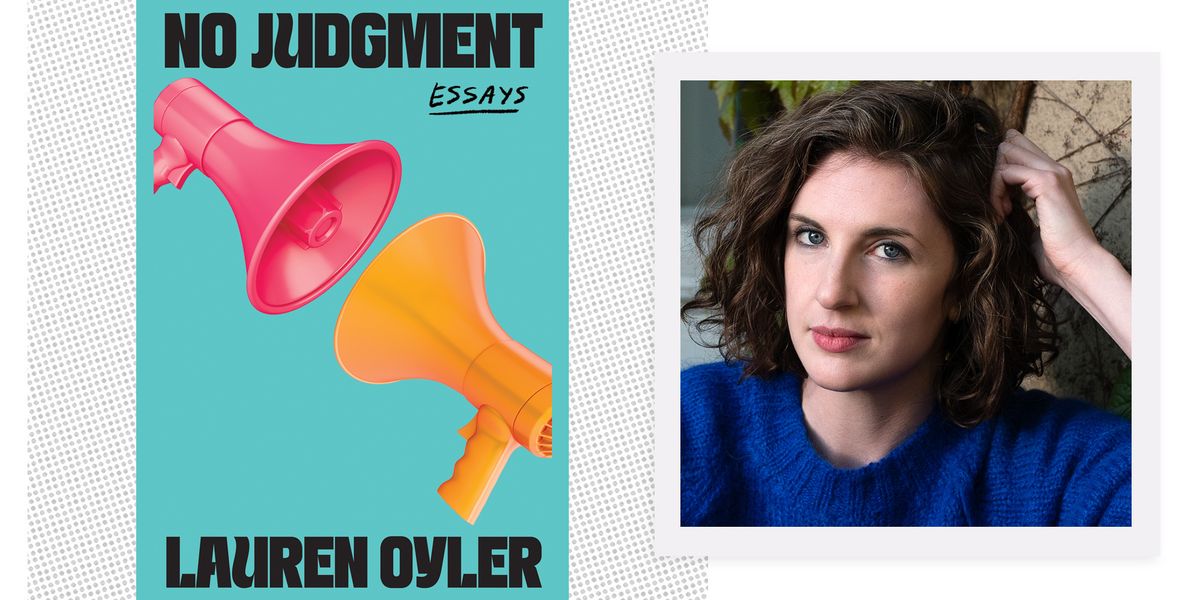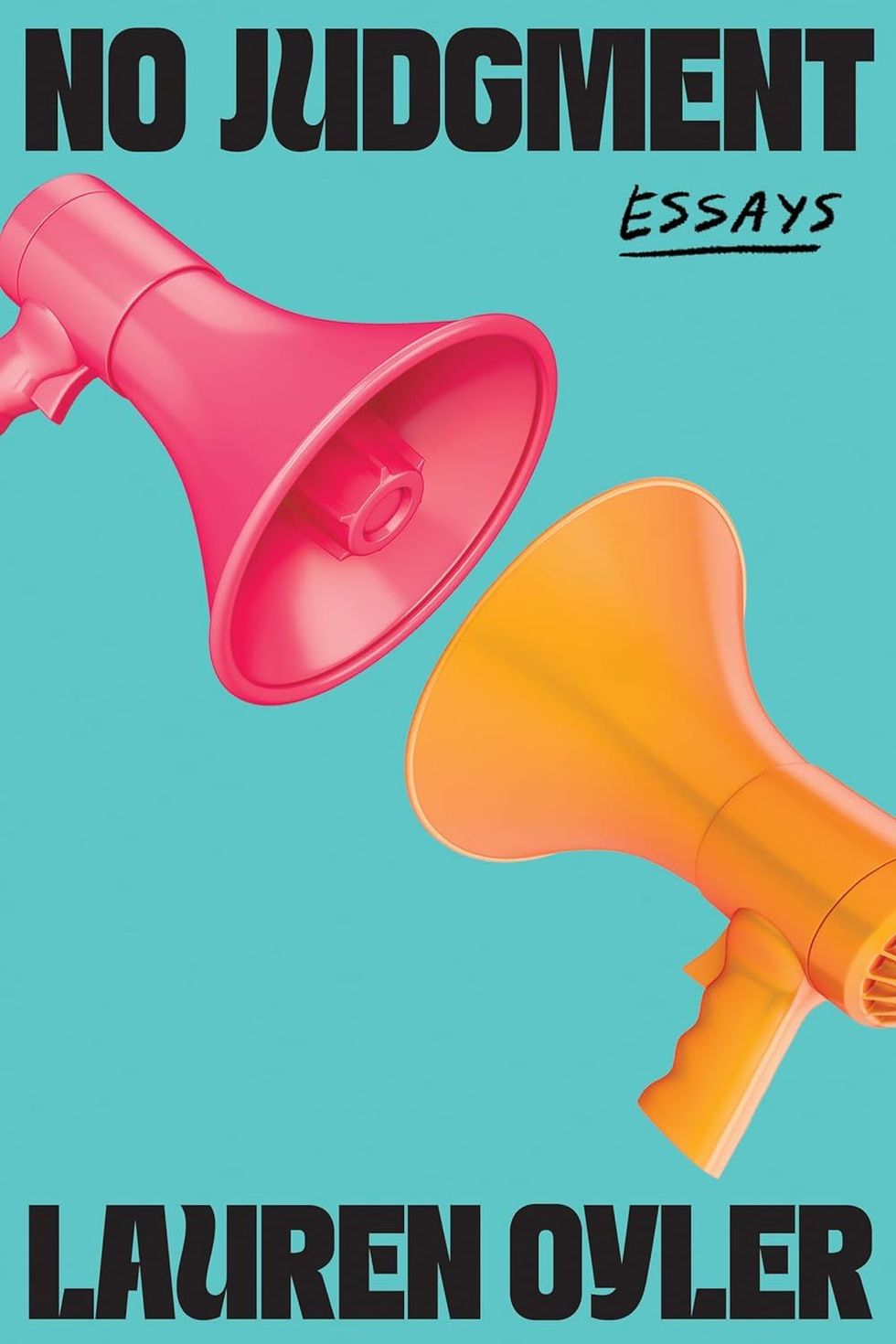“I don’t like posting anymore,” says novelist, essayist, and one of the world’s heavyweight champs of posting, Lauren Oyler. “I got out of that business.” But to paraphrase Trotsky: You may not be interested in posting, but posting is interested in you. Oyler is both celebrated and feared for her infamous literary takedowns and online feuds. Naturally, the fists are already flying in what is sure to be a rollercoaster rollout for her first essay collection, No Judgment.
When we speak, Oyler has just arrived back in Berlin after a three-week trip across India, which was “suitably distracting” from the anxieties of launching a new book. But now her agent wants her posting more on social media, and Oyler seems resigned, if not itching, to get back into the ring. Despite her more sedate online presence (the occasional X post and Instagram Stories of her travels) these days, there’s still something of the bare-knuckle fighter just beneath Oyler’s erudition, wit, and unrepentant elitism.
In No Judgment, Oyler gleefully swings at some of the most revered idols of the chronically online and globalized literati: Goodreads and spoilers, gossip, and TED Talks. In part, the work is thrilling to read because I can’t help imagining how it will inflame contemporary discourse. Maybe I’m naive, but I’m skeptical Oyler intentionally provokes readers. She’s not a shock jock churning out clickbait. (These are 40-page essays we’re talking about.) Rather, a writer—any writer—risks upsetting the public by meting out judgements as freely as Oyler does. Indeed, it’s something I’ve always admired about the author: She has thick skin and writes what she, and many others, think, but are too afraid to publish.
If No Judgment’s disparate essays suggest a central message, it’s that judging our world—its culture, people, and literature—comes at a price. Most just aren’t willing to pay it.
Below, Oyler walks ELLE.com through surviving elite institutions, the joys of romantic suffering, and how No Judgment came together.
We live in a world where the word “judgment” is immediately interpreted as a negative. Why do you think humanity is so prone to making judgments?
First and foremost, it’s a survival instinct. You’re judging people all the time because you’re judging when you’re in danger. “Someone is trying to hurt you” has now evolved into “someone’s trying to ruin my career; someone’s trying to steal my boyfriend.” That’s where the impulse comes from. A nicer way to think about it is that everybody is trying to figure out how to live. People in our milieu have a lot more freedom to determine how they live than most people throughout history. It’s quite hard to deal with all that freedom.
You’re fearless in expressing your opinions on books and culture, even if they spark controversy. Is there something you can point to in your life that has helped you get thick enough skin to speak your mind?
I’m quite sensitive, even to minor slights, but I don’t necessarily respond to them. I get a bad review, and then I spend 24 hours thinking, What am I gonna do about it? I’m able to not react emotionally. It’s not that I don’t feel things; it’s that I have control over my emotions so that I don’t have an outburst. This is something people should value. This is why the talk of “vulnerability” irks me so much, because people don’t want you to be in control of yourself. But control is what you need in order to be a good stylist and a competent, serious writer.
In the essay about Goodreads, you admit to being an elitist. You work in criticism for elite magazines, you went to Yale, etc. Tell me about your background. You grew up in Kentucky, right?
In West Virginia, even worse.
What was your family like?
My mother was a nurse. My father was a caterer. They got divorced when I was 3. One time I was at lunch with some editors at a big magazine and the senior editor was like, “What do your parents do?” And I said, “My dad is a caterer.” And he was like, “Oh, he runs a catering company.” And I was like, “No, he’s just a caterer.”
I wanted to leave West Virginia very badly. It’s a classic example of a place that has been ruined by corporations and the government. It’s very tragic. I really wanted to travel. To go to Europe, to do big things. I became disillusioned at Yale because a lot of those people are not very smart. I would find out that one of my classmates was fabulously wealthy, and I would be like, They dress horribly. Like, if I had even a fraction of the money you have, I would be wearing beautiful clothes. It’s the same principle with literature. Why are you writing this boring crap? Why aren’t you taking risks? Why are you doing this middlebrow genteel criticism and these soft bourgeois novels? You have nothing to lose. You are so rich, and I know because I gossip about you and I know what your parents do, and I know what your husbands and your wives do. That moment of disillusionment is probably much more important to why I write like this.
Your essays often reveal the dark and petty motivations behind those who purport to be “good” and “pious.” Why do you think piety and virtue are so en vogue?
Because it’s the easiest route to acceptance. It’s related to the trend for religion. Everybody’s becoming Catholic or being like, “The Bible has a lot to teach us!” This is not what I signed up for when I wanted to be a part of the elite. Striving to be a good person is fundamentally conservative; it’s a weird defensive maneuver against intellectual discomfort.
There’s lots of things that you can do in your life that don’t really matter in terms of the political beliefs you hold. The things you do in your day-to-day life have no effect on the wider world. That is difficult for people to accept because the internet has this scaled awareness that is basically incomprehensible. So you want to think of yourself as part of it and actually you are totally insignificant.
You’ve lived in Germany for many years. How has working in Berlin shaped the way in which you understand American culture?
It’s nice to not have to care about discourse so much, especially as the mechanism by which I would’ve learned about it is falling apart. Social media doesn’t work anymore. It’s hard to live under the illusion that you have a holistic sense of a place anymore. It has allowed me to have a more expansive curiosity. It’s been very good for my writing. I truly don’t miss the United States at all. I don’t care if I become out of touch with it because it’s not interesting and there’s more than enough interesting things happening in Berlin and also in Europe. It’s nice to be somewhere where everything is always going to be unfamiliar no matter how long I live here. It produces curiosity, which is very good for writing.
In the piece My Perfect Opinions, you try to understand why you write criticism. You note that it’s poorly paid, few people read it, and it’s time-consuming. What is it about a thankless calling like writing criticism that’s appealing to you?
The difficulty is appealing. What’s sad is people aren’t taught that difficult works are supposed to be difficult. That is where the meaning comes from. That is the point. Ulysses is supposed to be hard. It’s not supposed to make sense immediately. It’s not a television show where everything exists on the surface and you don’t need to interpret anything.
I don’t feel like my work is thankless. Writing criticism is something that uniquely torments me. I hate doing it in many ways, but I definitely feel like I should do it. I’m always glad that I have done it. And that is kind of the question that I’m working with there. Not that it’s thankless.
You write often about the chronically online, where everyone is always trying to be “right.” Why is being “right” perhaps the most intoxicating emotion these days?
It has become intoxicating for people not just to be right, but to be the critic. This has fueled the media for the last 10 years: to be combative, contrarian, reactionary. It seems it pays, right? People feel like their world is precarious, not just in a financial sense, but also like the news cycle is so rapid and everything is changing so fast that anything you say might vanish into the air and you could become humiliated. I write about this in No Judgment in the essay about spoilers. I want to be able to anticipate, which is different from, I want to know what’s gonna happen so that I’m not wrong. There’s lots of imagined pressure to be right. Actually, nobody cares what you think. Nobody cares what you say on social media, and nobody cares if you’re wrong. People forget great humiliating defeats of logic and reason happened in 2003 and all those guys still work at the Atlantic or whatever. It doesn’t actually matter, but it’s nice that to some people it’s important.
What for you is the relationship between sex and writing?
I want to have an exciting life, but I also want to write great books and essays, and I think that you need to have life experiences to do that. Anything counts as a life experience. Sitting on Twitter all day counts as a life experience! It’s all about how you frame it. But I do have a desire for emotional intensity just like I have a desire for literary drama. It upsets me when people are like, “You just did that so that you could write about it.” And I’m like, “Absolutely not!” All the horrible pain that romantic suffering causes is not worth it just to write about it. It’s for some other reason. And I suppose a great project in my life will be to determine what that is.
You can go party at Berghain with any three writers, living or dead. Who are they?
My real answer is Guillaume Dustan, Torrey Peters, and Balzac. My chaos-demon answer is Hans Christian Anderson, Simone Weil, and Percival Everett. Regardless, I firmly believe the ideal “crew” size for Berghain is five (once inside, of course).
This interview has been edited and condensed for clarity.

